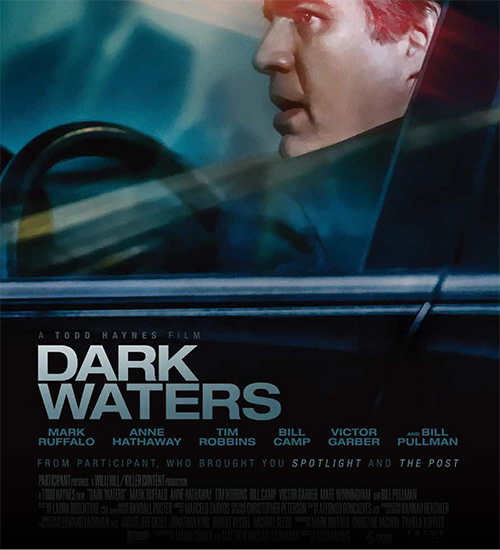Oct 01, 2021

A public
screening of the film “Dark Waters” at St. Bonaventure University on Tuesday, Oct. 19, followed by a forum with scientific and legal experts, will draw attention to health risks associated with a group of man-made chemicals that have been
detected in food, soil, drinking water and even breast milk.
Presented by the School of Arts and Sciences at St. Bonaventure in collaboration with the university’s Regina A. Quick Center for the Arts, the program begins with a showing of the film in the Quick Center’s Rigas Family Theater at 4:30 p.m.,
followed by a half-hour panel discussion.
The program is open to the public and free of charge but seats are limited. Those planning to attend should register at the
www.sbu.edu/dark-waters website.
Dr. Scott Simpson, associate professor of chemistry at St. Bonaventure, was awarded a research grant from the National Science Foundation in 2019 to investigate these so-called “forever compounds,” known by scientists as per- and polyfluoroalkyl
substances (PFAS). Through the collaborative research effort of scientists at St. Bonaventure and at the State University of New York at Buffalo, identification of emerging PFAS is underway in an attempt to determine how long these compounds stay
in the environment and aid in the assessment of potential health risks.
“There is evidence to show that PFAS exposure can lead to adverse health outcomes in humans,” said Simpson. “The Environmental Protection Agency has established health advisories for two of these compounds. However, more than 5,000 different
PFASs are potentially released from the multiple formulations produced throughout the U.S.”
“Dark Waters,” a 2019 PG-13 legal thriller starring Mark Ruffalo, Anne Hathaway, Tim Robbins and Bill Pullman, tells the story of a years-long legal battle waged by attorney Robert Bilott against the DuPont chemical corporation after unexplained
cattle deaths in West Virginia. DuPont eventually settled more than 3,500 disease cases for $671 million.

Bilott
will be among six panelists on the forum following the film. He will participate via teleconferencing technology, joining the five others who will be on Rigas Theater stage.
An internationally recognized litigator, advocate and author, Bilott represents a diverse range of clients on a wide variety of matters involving federal, state and local environmental laws. To date, he has secured benefits in excess of $1 billion for
clients adversely impacted by PFAS contamination. In 2017, he received the International Right Livelihood Award, known as the “Alternative Nobel Prize,” for his decades of work on PFAS cases.
Joining him on the panel is Simpson, who has authored 28 peer-reviewed research articles. Simpson is also a member of St. Bonaventure’s Consortium for the Study of Pregnancy and Prenatal Development, where his research is focused on identifying
environmental contaminants that may negatively impact developing fetuses. In addition to the collaborative PFAS research between researchers at SBU and the University at Buffalo, Simpson’s research group is also exploring ways to store and
release hydrogen as a clean and renewable alternative to fossil fuels.
Rounding out the panel will be:
- Dr. Diana S. Aga, the Henry M. Woodburn Professor of Chemistry at the University at Buffalo. Aga, who leads a team that studies how a wide range of chemicals affect the environment, was awarded the 2017 American Chemical Society Schoellkopf Medal
in recognition of her work in environmental chemistry.
- Rebecca Dickman, a Ph.D. candidate in chemistry and research assistant at the University at Buffalo. Dickman earned her Bachelor of Science in environmental geosciences at UB, conducting research in hydrology and water quality assessment with
Dr. Christopher Lowry, director of graduate studies and associate professor of geology.
- Irene J. Fisher, a hydrologist for the U.S. Geological Survey's New York Water Science Center. Fisher manages water-quality projects on Long Island, with a special interest in contaminants of emerging concern. Her projects include documenting
the occurrence and persistence of wastewater-derived contaminants, current and legacy-use pesticides, and per- and polyfluoroalkyl substances (PFAS) within groundwater and surface water.
- Michael LaRock, from Chemung, New York, is a senior chemistry major at St. Bonaventure University. His interests lie in bringing science education and awareness to rural and underserved communities. He works with Dr. Simpson's team, predicting
and identifying PFAS in water, soil, or waste.
More thorough biographies of the panelists are available at the event webpage,
www.sbu.edu/dark-waters
.
______________
About the University: The nation’s first Franciscan university, St. Bonaventure University is a community committed to transforming the lives of our students inside and outside the classroom, inspiring in them a lifelong commitment to service
and citizenship. In 2020, St. Bonaventure was named the #2 regional university value in New York and #3 in the North by U.S. News and World Report.